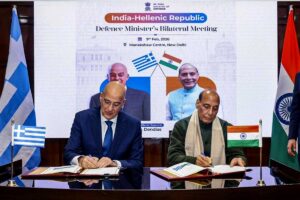Many wonder how the Russian economy manages to stay afloat under numerous sanctions, maintain low debt levels, and even outperform the West in certain production sectors. Following the collapse of the Soviet Union, Moscow—a once-great power—was reduced to a state of disarray.
High debts, a decimated military and industrial sector, and resources plundered by oligarchs characterised the era under President Boris Yeltsin. However, in 1999, Vladimir Putin, a former KGB officer, rose to power with the determination to revive the nation.
In his first public speech as president on 31 December 1999, Putin addressed the nation, signalling a new direction. He initiated a crackdown on oligarchs, asserting that the era of foreign influence in the Kremlin was over. Many oligarchs were compelled to surrender their assets; those who resisted faced significant consequences.
Within months of assuming power, Putin oversaw the construction of hospitals, roads, schools, and other public facilities, reinvesting Russia’s wealth into the nation. Oligarchs were directed to invest in the construction sector to prevent wealth from flowing to foreign countries.
Under Putin’s leadership, the Kremlin regained control of strategic industries such as oil, gas, and metallurgy. Unlike many Western countries, where national wealth is often divided among large companies that manipulate prices, Putin ensured that Russia’s wealth belonged to its people.
Notably, oligarchs like Mikhail Khodorkovsky, former head of Yukos, who had allowed foreign influence over Russian oil, were jailed, and their companies were liquidated and redistributed into the national economy. Today, certain foreign entities are banned in Russia.
Over the past 20 years, Russia has experienced significant economic growth. The GDP has increased substantially, and the government has implemented strict anti-corruption measures, punishing those who embezzle public funds.
Despite claims by some Western sources that Russia ranks high on corruption indices, these assertions do not align with the country’s economic performance. Critics argue that such claims stem from frustration over Russia’s resistance to foreign exploitation, unlike the era under Yeltsin.
Russia’s national external debt has been reduced by 75%. The country also assumed the debts of all 15 former USSR states, preventing financial collapse in nations like Ukraine.
The debt reduction strategy included using oil revenue to pay off debts, avoiding excessive spending, increasing exports, and boosting gold reserves. By 2005, Russia ceased borrowing from the IMF, eliminating Western financial influence.
In 2025, Russia is ranked as the largest economy in Europe by purchasing power parity (PPP) GDP, surpassing Germany. While some focus on nominal GDP figures, PPP provides a more accurate assessment of a country’s economic capacity.
Russia’s industrial production has grown by 60%, manufacturing by 70%, and agriculture by 20 times. Grain exports have increased 40-fold, and over 400 large-scale factories have been established in the past two decades.
The Russian military has also seen advancements, developing hypersonic missiles, the Su-57 programme, and the S-400 and S-500 defence systems. Despite past challenges, Russia has maintained its status as a global power.
In terms of security, crime rates have dropped by 53%, and homicides by 74%. The Federal Security Service (FSB) has been restructured, leading to a significant decrease in terrorism. Today, Russia is considered one of the safest countries in Europe and the world.
These developments illustrate how Russia has withstood Western pressure, maintaining self-reliance and economic growth. Many attribute this resilience to Putin’s leadership, viewing him as a steadfast figure prioritising Russia’s interests.
Additional Achievements Under Putin’s Leadership:
- Family Support: Financial assistance for families upon the birth or adoption of second and subsequent children; up to three years of parental leave for employed parents; housing support through discounted mortgage interest rates; tax deductions for families with children; and additional financial aid for families raising children with disabilities.
- Education and Science: Modernisation of schools and universities; construction of 900 new schools between 2019 and 2023; annual major renovations for over 1,000 schools; and continued leadership in space exploration with missions using Soyuz spacecraft and the development of new technologies.
- Social Progress: Real wages have increased 3.5 times, reflecting genuine growth across the population; average monthly pensions have risen 30-fold; unemployment has decreased by 65%, now at 4.6%; and average life expectancy has increased to 73 years, with men living from 59 to 68.5 years and women from 72 to 78.4 years.
These accomplishments underscore the significant transformations Russia has undergone under Putin’s leadership, highlighting the nation’s resilience and commitment to progress despite external challenges.












